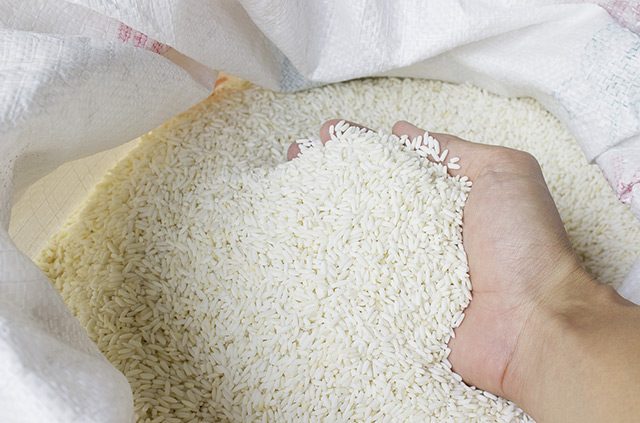SUMMARY
This is AI generated summarization, which may have errors. For context, always refer to the full article.

MANILA, Philippines (UPDATED) – The National Food Authority (NFA) has begun daily nationwide inspections of rice stores as it investigates reports of fake rice being sold in the country.
The NFA, lef by its chief Renan Dalisay, conducted a surprise inspection in Cartimar market in Pasay City on Tuesday, June 30. The NFA inspection team also visited the stores of 3 retailers suspected of selling smuggled rice from China.
“We inspected and served summons to the owners. We have not issued import permits for [rice coming from] China,” said Dalisay.
The NFA’s Technical Research Services Department (TRSD) will determine the age of the rice to determine if it was part of the batch auctioned in October 2014 by the BOC.
Presidential Assistant for Food Security and Agricultural Modernization Francis Pangilinan, who oversees the NFA, said Dalisay has assured him that the NFA is “on top of this issue and that aside from the inspections being conducted, an investigation is on-going and will not stop until we get to the bottom of this.”
Fake rice report
NFA-Davao City informed the NFA head office of a report it received on June 26, regarding the alleged sale of fake rice in the city.
Davao City resident Carmencita Grinio reported to the NFA that she bought rice from Cuidad Esperanza canteen in Cabantian, Davao City, which reportedly had the appearance of stypopor, a synthetic packaging material.
NFA Davao City Provincial Manager Virgilio Alerta gathered samples from the store of the alleged supplier of the canteen, who denied she sold rice to the latter. The canteen also denied being the source of fake rice.
NFA Davao is verifying the complainant’s report, and has submitted samples of the alleged fake rice, provided by Grinio, to the Food Development Center for laboratory tests, Pangilinan said.
Pangilinan said his office has coordinated with the Bureau of Customs and the Philippine Coast Guard “to intensify watch in all our ports and ensure none of this fake rice will get into country.”
“We are also closely working with the Grains Retailers Confederation of the Philippines (GRECON) to intensify monitoring as they are the ones present in all the markets in the country. We cannot let fake rice reach the tables of the Filipinos,” he said.
In a news briefing on Tuesday, Dalisay urged those who suspect they have purchased fake rice to provide a sample weighing at least one kilogram so that the lab test would be more conclusive.
He said reports on suspicious rice sold in the market can be relayed through NFA hotline 09064363133.
‘Check small shops in rural areas’
Meanwhile, Senator Cynthia Villar, the chair of the Senate committee on agriculture, said that “special attention must be given to small shops in rural areas, where fake rice could be discreetly sold.”
Villar, who is also concurrent chair of the Congressional Oversight Committee on Fisheries and Agricultural Modernization, said that authorities should be mindful that the fake rice can be mixed with regular rice to avoid detection.
“Obviously, the manufacturer of fake rice is doing this in the name of profit. We heard this is cheaper to produce and looks very much like the farm-grown rice. Our fear is that many of our kababayan (countrymen) will not be able to tell the difference and will be deceived into buying this cheaper type,” Villar said.
Fake rice is reportedly made from potatoes, sweet potatoes, plastic, and materials found in pipes and cables. Its sale had been reported in countries like China, India, Indonesia, Malaysia, and Vietnam.
Villar urged the government to conduct an information campaign to help consumers identify fake rice and to encourage them to report incidents to authorities, to prevent the public from ingesting toxic materials.
“Maraming magkakamali dito at ang sabi pa nga, one week na daw hindi pa napapanis ang kanin. Magmadali tayo dito dahil parang kumakain ka ng plastic kapag ito ang kinain mo,” she said.
(Many might buy it by mistake. It’s been said that it doesn’t spoil even after a week. We should act swiftly because eating this is like eating plastic.) – Rappler.com
Sack of rice image via Shutterstock
Add a comment
How does this make you feel?
There are no comments yet. Add your comment to start the conversation.